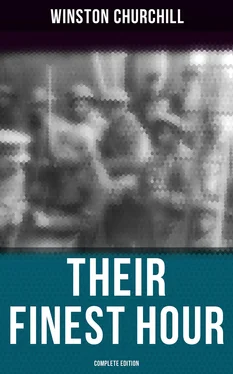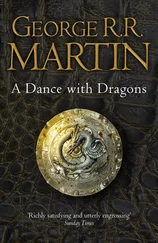Winston Churchill - Their Finest Hour (Complete Edition)
Здесь есть возможность читать онлайн «Winston Churchill - Their Finest Hour (Complete Edition)» — ознакомительный отрывок электронной книги совершенно бесплатно, а после прочтения отрывка купить полную версию. В некоторых случаях можно слушать аудио, скачать через торрент в формате fb2 и присутствует краткое содержание. Жанр: unrecognised, на английском языке. Описание произведения, (предисловие) а так же отзывы посетителей доступны на портале библиотеки ЛибКат.
- Название:Their Finest Hour (Complete Edition)
- Автор:
- Жанр:
- Год:неизвестен
- ISBN:нет данных
- Рейтинг книги:5 / 5. Голосов: 1
-
Избранное:Добавить в избранное
- Отзывы:
-
Ваша оценка:
- 100
- 1
- 2
- 3
- 4
- 5
Their Finest Hour (Complete Edition): краткое содержание, описание и аннотация
Предлагаем к чтению аннотацию, описание, краткое содержание или предисловие (зависит от того, что написал сам автор книги «Their Finest Hour (Complete Edition)»). Если вы не нашли необходимую информацию о книге — напишите в комментариях, мы постараемся отыскать её.
Their Finest Hour covers the period in World War 2 after the fall of France when Britain stood alone, with victorious Germany and Italy engaged in mortal attack upon them, with Soviet Russia a hostile neutral actively aiding Hitler, and Japan an unknowable menace. Churchill labeled the «moral of the work» as follows: «In War: Resolution, In Defeat: Defiance, In Victory: Magnanimity, In Peace: Goodwill»
Their Finest Hour (Complete Edition) — читать онлайн ознакомительный отрывок
Ниже представлен текст книги, разбитый по страницам. Система сохранения места последней прочитанной страницы, позволяет с удобством читать онлайн бесплатно книгу «Their Finest Hour (Complete Edition)», без необходимости каждый раз заново искать на чём Вы остановились. Поставьте закладку, и сможете в любой момент перейти на страницу, на которой закончили чтение.
Интервал:
Закладка:
Now at last the slowly-gathered, long-pent-up fury of the storm broke upon us. Four or five millions of men met each other in the first shock of the most merciless of all the wars of which record has been kept. Within a week the front in France, behind which we had been accustomed to dwell through the hard years of the former war and the opening phase of this, was to be irretrievably broken. Within three weeks the long-famed French Army was to collapse in rout and ruin, and our only British Army to be hurled into the sea with all its equipment lost. Within six weeks we were to find ourselves alone, almost disarmed, with triumphant Germany and Italy at our throats, with the whole of Europe open to Hitler’s power, and Japan glowering on the other side of the globe. It was amid these facts and looming prospects that I entered upon my duties as Prime Minister and Minister of Defence and addressed myself to the first task of forming a Government of all parties to conduct His Majesty’s business at home and abroad by whatever means might be deemed best suited to the national interest.
Five years later almost to a day it was possible to take a more favourable view of our circumstances. Italy was conquered and Mussolini slain. The mighty German Army had surrendered unconditionally. Hitler had committed suicide. In addition to the immense captures by General Eisenhower, nearly three million German soldiers were taken prisoners in twenty-four hours by Field-Marshal Alexander in Italy and Field-Marshal Montgomery in Germany. France was liberated, rallied, and revived. Hand in hand with our Allies, the two mightiest empires in the world, we advanced to the swift annihilation of Japanese resistance. The contrast was certainly remarkable. The road across these five years was long, hard, and perilous. Those who perished upon it did not give their lives in vain. Those who marched forward to the end will always be proud to have trodden it with honour.
***
In giving an account of my stewardship and in telling the tale of the famous National Coalition Government it is my first duty to make plain the scale and force of the contribution which Great Britain and her Empire, whom danger only united more tensely, made to what eventually became the Common Cause of so many States and nations. I do this with no desire to make invidious comparisons or rouse purposeless rivalries with our greatest Ally, the United States, to whom we owe immeasurable and enduring gratitude. But it is to the combined interest of the English-speaking world that the magnitude of the British war making effort should be known and realised. I have therefore had a table made which I print on the following page, which covers the whole period of the war. This shows that until July 1944 Britain and her Empire had a substantially larger number of divisions in contact with the enemy than the United States. This general figure includes not only the European and African spheres, but also all the war in Asia against Japan. Till the arrival in Normandy in the autumn of 1944 of the great mass of the American Army, we had always the right to speak at least as an equal and usually as the predominant partner in every theatre of war except the Pacific and the Australasian; and this remains also true, up to the time mentioned, of the aggregation of all divisions in all theatres for any given month. From July 1944 the fighting front of the United States, as represented by divisions in contact with the enemy, became increasingly predominant, and so continued, mounting and triumphant, till the final victory ten months later.
Another comparison which I have made shows that the British and Empire sacrifice in loss of life was even greater than that of our valiant Ally. The British total dead, and missing, presumed dead, of the armed forces amounted to 303,240, to which should be added over 109,000 from the Dominions, India, and the Colonies, a total of over 412,240. This figure does not include 60,500 civilians killed in the air raids on the United Kingdom, nor the losses of our Merchant Navy and fishermen, which amounted to about 30,000. Against this figure the United States mourn the deaths in the Army and Air Force, the Navy, Marines, and Coastguard, of 322,188. 1 I cite these sombre Rolls of Honour in the confident faith that the equal comradeship sanctified by so much precious blood will continue to command the reverence and inspire the conduct of the English-speaking world.
On the seas the United States naturally bore almost the entire weight of the war in the Pacific, and the decisive battles which they fought near Midway Island, at Guadalcanal, and in the Coral Sea in 1942 gained for them the whole initiative in that vast ocean domain, and opened to them the assault of all the Japanese conquests, and eventually of Japan herself. The American Navy could not at the same time carry the main burden in the Atlantic and the Mediterranean. Here again it is a duty to set down the facts. Out of 781 German and 85 Italian U-boats destroyed in the European theatre, the Atlantic and Indian Oceans, 594 were accounted for by British sea and air forces, who also disposed of all the German battleships, cruisers, and destroyers, besides destroying or capturing the whole Italian Fleet.
LAND FORCES IN FIGHTING CONTACT WITH THE ENEMY “EQUIVALENT DIVISIONS”
NOTES AND ASSUMPTIONS
(a) B.E.F. in France.
(b) Excludes guerrillas in Abyssinia.
(c) Excludes Filipino troops.
The dividing line between the Eastern and Western theatres is taken as a north/south line through Karachi.
The following are NOT taken as operational theatres:
N.W. Frontier of India; Gibraltar; West Africa; Iceland; Hawaii; Palestine; Iraq; Syria (except on July 1, 1941).
Malta is taken as an operational theatre; also Alaska from Jan. 1942 to July 1943. Foreign contingents—e.g., Free French, Poles, Czechs—are NOT included. The table of U-boat losses is as follows:
U-Boat Losses  Grand total of U-boats destroyed, 996
In the air superb efforts were made by the United States to come into action, especially with their daylight Fortress bombers, on the greatest scale from the earliest moment after Pearl Harbour, and their power was used both against Japan and from the British Isles against Germany. However, when we reached Casablanca in January 1943 it is a fact that no single American bomber plane had cast a daylight bomb on Germany. Very soon the fruition of the great exertions they were making was to come, but up till the end of 1943 the British discharge of bombs upon Germany had in the aggregate exceeded by eight tons to one those cast from American machines by day or night, and it was only in the spring of 1944 that the preponderance of discharge was achieved by the United States. Here, as in the armies and on the sea, we ran the full course from the beginning, and it was not until 1944 that we were overtaken and surpassed by the tremendous war effort of the United States. It must be remembered that our munitions effort from the beginning of Lend-Lease in January 1941 was increased by over one-fifth through the generosity of the United States. With the materials and weapons which they gave us we were actually able to wage war as if we were a nation of fifty-eight millions instead of forty-eight. In shipping also the marvellous production of Liberty Ships enabled the flow of supplies to be maintained across the Atlantic. On the other hand, the analysis of shipping losses by enemy action suffered by all nations throughout the war should be borne in mind. Here are the figures:
Читать дальшеИнтервал:
Закладка:
Похожие книги на «Their Finest Hour (Complete Edition)»
Представляем Вашему вниманию похожие книги на «Their Finest Hour (Complete Edition)» списком для выбора. Мы отобрали схожую по названию и смыслу литературу в надежде предоставить читателям больше вариантов отыскать новые, интересные, ещё непрочитанные произведения.
Обсуждение, отзывы о книге «Their Finest Hour (Complete Edition)» и просто собственные мнения читателей. Оставьте ваши комментарии, напишите, что Вы думаете о произведении, его смысле или главных героях. Укажите что конкретно понравилось, а что нет, и почему Вы так считаете.











